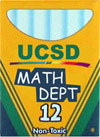 Getting Feedback
Getting Feedback
Feedback about your teaching is crucial for two reasons. First, it allows you to improve your craft by examining yourself through the eyes of your audience. Second, it provides you with physical evidence that you know how to teach, which may be of significant interest to future employers. There are a number of ways to get feedback here at UCSD Math, and together they address both of these concerns.
Online Evaluations (automatic)
Towards the end of the quarter every student in your sections will get an automatically generated email asking them to fill out a simple evaluation of discussion sections and the TA. These can be a useful source of constructive criticism (and just plain humor), since students, cloaked in anonymity, can make very candid comments about how they felt the course went. Student evaluations are immensely important later on when you're trying to get a job, since they can be used as evidence of your effectiveness in the classroom.
After the end of the quarter you will receive a printout summarizing these results. If you get good reviews, hooray! Be sure to store the results printout somewhere. If you get mediocre reviews, make it a point to absorb students' complaints -- you may have a hard time getting assigned to the more advanced or more popular sections if the complaints are substantial. If you get terrible reviews, you'll probably be hearing from the Vice Grad Chair or the Senior TA.
Self-administered Evaluations (optional)
You are not required to administer your own set of TA evaluation forms. Before the online evals were instituted in 2008, however, the department strongly recommended that we do so.
Since the department does not require these, there is no "official" student TA evaluation form. However, the Teaching and Learning Commons has provided some ready-made forms that you may like. Of course, you can also make your own. I recommend that you pass these out on the last day or so of section, and give the students about 5 or 10 minutes to fill them out while you wait outside the room. Have one student collect and seal the evals in an envelope, and promise to the students that you won't open the envelope until after the final is graded. You're more likely to get candid responses this way. Note that these evals are yours to keep. If you can amass a reasonable stack of good ones after a few years, you'll be in good shape to ask for a teaching letter, or apply for various awards or positions within the department.
Faculty Evaluations (required)
Department policy stipulates that the instructor of every course for which you TA complete a departmental TA evaluation of your performance at the conclusion of every quarter. These records are kept permanently in your student file for future reference by faculty and administration.
Typically, instructors comment on whether you have fulfilled your TA responsibilities, your strengths and weaknesses as a TA, and whether they would accept you as a TA again. Unless you've really messed up somewhere, these tend to be short but positive (since the instructors usually don't have a chance to observe you in discussion section or office hours).
Sometime during the quarter following your evaluation, will ask you to look over and sign these forms, indicating that you have read the instructor's evaluation. There is space provided for comments that you may have concerning the evaluation.
Head TA Observations (required for first-years)
During your first quarter TAing here, the Head TA will attend one of your discussion sections to watch how you interact with your students, how well you control the class and the time, how effectively you present the materials, etc. Afterward, he or she will arrange to sit down with you and talk about what s/he observed in the class and make suggestions on what was effective and what could use improvement.
The purpose of the observation is explicitly non-evaluative. We believe that all instructors can improve their teaching skills and each TA is viewed from his or her initial level of experience and background. Suggestions are provided to improve student learning and the TA's teaching effectiveness. It should be noted that no permanent record is kept. Rather, this informal meeting is a chance for you to get some constructive criticism on your TAing from someone who has considerable experience in the UCSD Math Department.
CTD Observations (sometimes required for first-years)
In addition to the Head TA observation, you may also be visited by a consultant from the Teaching and Learning Commons Classroom Observations. These observations have the added bonus that (a) the CTD person will collect student evaluations at the time and (b) s/he will take the data from these evaluations and distill them into a single condensed sheet, which is a nice thing to have for your own records. In addition, CTD will video record you on request. See more about these observations here.
Peer Observations (optional)
This is an opportunity for a fellow math TA (besides the Head TA) to officially observe one of your sections. The follow-up one-on-one (and completely confidential) discussion about the observation has great potential to help both you and your observer become better teachers. We will provide an observation checklist and some tips for making the most out of the observation. Otherwise, we'll be counting on you to make it all happen. In particular, no one else will be involved in the observations and meetings, and no reports or critiques will appear on anyone's official record.
Stay tuned for more information about this new program.
